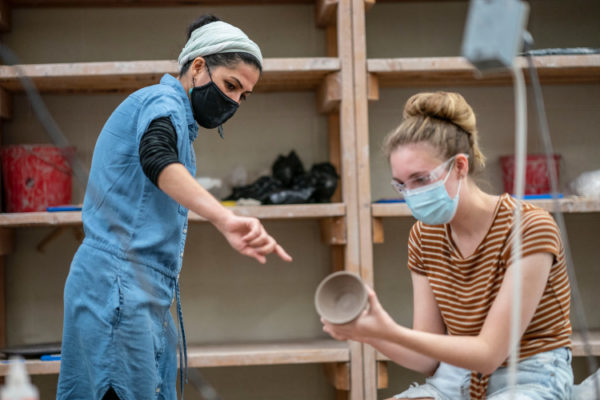MyVU is spotlighting a select group of new faculty for 2020-21. Read more profiles in the series.
Raheleh Filsoofi, a new assistant professor in the Department of Art, says the opportunity to be part of a dynamic, uplifting art community is what drew her to Vanderbilt. In fact, one of the first artists who inspired Filsoofi, upon arriving in Miami in 2002 after emigrating from her native Iran, was Maria Magdalena Campos-Pons, a fellow émigré and now Cornelius Vanderbilt Professor of Art.
“I didn’t have the opportunity to meet her,” says Filsoofi, a social practice artist whose work crosses disciplines, “but her work as a woman-of-color artist encouraged me.”
“I’ve watched the struggles of so many immigrant families with a deep empathy and encouraged my students to engage with programs that serve the community and educate through the arts.”
Filsoofi grew up during the Islamic Revolution and an eight-year war between Iran and Iraq. “My memories are mostly aural, rather than visual, because I often stayed inside my house for protection,” she says. “There were sounds of people marching in the streets, helicopters flying overhead and explosions.”
She also remembers the happy sounds of family conversations and prayers from a mosque. In her installation Only Sound Remains, Filsoofi uses 11 ceramic vessels, inspired by the tradition of her ancestors, to hide and shape sounds that convey her experiences. The vessels, she says, represent the place where memories that people keep to themselves are processed and stored.
Another installation, The Inh(a/i)bited Space, consists of ceramic vessels that emit a cacophony of sounds, including navigation directions mixed with political rhetoric on immigration policies. Filsoofi, who has future solo exhibitions planned for the Space 204 Gallery in the E. Bronson Ingram Studio Arts Center and The New Gallery at Austin Peay State University, views her work as a bridge between Iranian and American culture.

“Immigration is a major theme because I have lived through it,” she says. “I arrived full of hope, but experienced emotional hurt and rejection during my first five years in the United States, when government immigration policies prevented me from pursuing my education and career.”
Filsoofi earned a master of fine arts in ceramics from Florida Atlantic University and has taught ceramics the past four years at the University of Texas Rio Grande Valley, near the Mexican border. “I’ve watched the struggles of so many immigrant families with a deep empathy and encouraged my students to engage with programs that serve the community and educate through the arts,” she says.
At Vanderbilt, Filsoofi is teaching two introductory courses on ceramics this fall. “Building community is more important than ever during the pandemic,” she says. “We collaborate on everything from organizing the lab to glazing the ceramics—while following strict health and safety protocols. Art is extremely beneficial at this time because it stimulates the imagination. I want to help students move forward in their own work and discipline by what we learn in ceramics.”